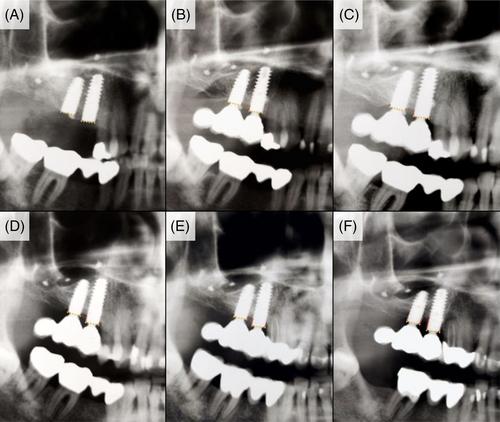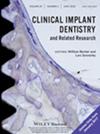Progressive bone loss and bleeding on probing: A cohort study
Abstract
Aim
To investigate whether a progressive marginal bone loss (PMBL) occurring beyond the initial bone remodeling (IBR) is linked with bleeding on probing.
Materials and Methods
A total of 70 partially edentulous patients exhibiting 112 two-piece bone-level implants were included in this retrospective study. Panoramic radiographs were obtained after implant insertion (T0), after delivery of a final prosthetic restoration (T1) and subsequently during the 1-(T2), 5-(T3), 10-(T4), and 15-years (T5) follow-up visits. At each time point, radiographic marginal bone levels were assessed from the implant shoulder to the first bone-to-implant contact at mesial and distal aspects. The IBR was defined as a bone loss occurring up to prosthesis delivery, that is, from T0 to T1. The PMBL was defined as bone loss occurring after T1. At T2, T3, T4, and T5, the presence or absence of bleeding on probing (BOP) was recorded at four sites. A median regression with mixed models was performed to assess the difference of PMBL in PMBL + BOP+ and PBML + BOP− groups.
Results
Over the mean implant functioning time of 4.44 ± 4.91 years, 38 (34%) implants showed no PBML, whereas 74 (66%) implants featured PMBL. Of these, 35 (47%) and 39 (53%) implants were assigned to the PMBL + BOP− and PMBL + BOP+ groups, respectively. The mean PMBL after 1, 5, 10, and 15 years were comparable between implants featuring PMBL with or without BOP. At 1 year, BOP intensity significantly correlated PMBL, with each increase in one BOP-positive site being associated with increase in PMBL by 0.55 mm (p = 0.038), whereas this association was not found at 5, 10, and 15 years. The IBR values in the no PBML, PMBL + BOP+, and PBML + BOP− groups were −0.24 ± 0.31, −0.41 ± 0.59, and −0.24 ± 0.33 mm, respectively, with no significant differences found among the groups.
Conclusion
Progressive bone loss at implant sites is not always linked with bleeding on probing.


 求助内容:
求助内容: 应助结果提醒方式:
应助结果提醒方式:


